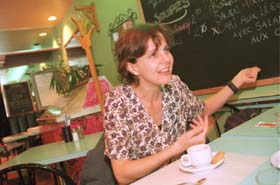

 |

Joan Butterworth: At the improv
Joan Butterworth knows her apples and is pretty particular about when she eats them. Having been raised the latter half of her childhood on an apple orchard near Dunham in the west end of the Eastern Townships, she can't abide an apple out of season or a Delicious in any season (too soft and generic-tasting).
"I usually start eating apples at the end of July and finish in October," says the fees coordinator of the Admissions and Registrar's Office.
To everything, a season -- or, at least a time. Theatre, too, has a particular time in Butterworth's life. On Thursday evenings, three weeks out of four, Butterworth leaves her role of helping students with unusual fee situations to co-lead a theatre improvisation group she began last September with Montreal playwright Steve Galluccio. At the moment, it's her one regular theatre gig, though Butterworth performs frequently in Galluccio's plays and in productions by other playwrights.
Like Chekhov, a favourite. She dreams of performing in Uncle Vanya. Years ago, Butterworth performed in The Marriage Proposal by the Russian playwright. That was when she was with McGill graduate Albert Nerenberg's infamous improvisational troupe, Theatre Shmeatre, which took theatre to the streets, to the University's cafeteria (where Butterworth once played the role of a woman being sexually harassed during Sexual Harassment Awareness Week!) and to tiny bars and lofts on St. Lawrence Blvd.
It was with Theatre Shmeatre that Butterworth gained her love of theatre and of improvisation, in particular. This was the late '80s and Butterworth had already graduated from McGill in English and was working in the Registrar's Office.
Though she also qualified to teach English in high school and to teach English as a second language, she found it impossible to combine theatre with teaching. Work in the Registrar's Office proved more compatible with her occasionally demanding passion.
In fact, Butterworth enjoys the human element of both her work and improvisation.
"I find the people aspect is a real link between theatre and my work," she says. "I enjoy dealing with people and fixing problems."
A frequent problem arising in her office relates to international student fee exemptions. Students from certain countries are exempt from paying the higher fee, but have to have the necessary papers. Likewise, some students qualify as permanent residents but, again, they have to have the papers to prove it. Sometimes, Butterworth's the one who has the thankless task of saying: "Sorry, but …"
At the improv sessions, there are no "sorry, buts"; "you say 'yes' to all," says Butterworth. After the initial physical warm-up, involving stretches, Butterworth will initiate the "one-word story" where each person says only one word to build a story, and then the group might move into a "freeze," where the actor changes from human to animal, child to elder, man to woman, etc., at each cry of the word, "freeze." Then the group might progress to "soap-opera freeze" where players take on a single role but must change the scene they're in at the word "freeze."
One thing that participants learn is to take risks, says Butterworth. "There's a risk of success or failure and with either you learn something." The 10 members of the workshop come from the ranks of students, the theatre and the writing community. "For writers, it's an interesting forum. They can see how dialogue unfolds."
Butterworth finds improvisation "a great tool for brainstorming or coming up with different ideas, not stopping any ideas, which has its role in problem-solving at work. You can say: 'What about this? What about that?'" she muses, mentioning that her department is currently faced with a major challenge -- having to figure out how to deal with the new student information system soon to come online. Improv, anyone?
A long-time co-worker of Butterworth and her one-time supervisor, associate registrar Steve Olive, values her "good sense of humour" and her conscientiousness. "With students having problems, she's always extremely thoughtful. She's a big asset to the department." A good apple, in other words.
Bronwyn Chester
|
 | SOS sent to premier
|
 In a letter sent last month to Premier Lucien Bouchard, and published in the Université de Montréal's newspaper, Forum, 63 Quebec scientists and artists voiced their concern regarding the future of Quebec universities. All winners of either a Prix du Québec or a prize from the Association canadienne-française pour l'avancement des sciences (ACFAS), the signatories implored the premier to wake up to the crisis reigning in the province's universities.
In a letter sent last month to Premier Lucien Bouchard, and published in the Université de Montréal's newspaper, Forum, 63 Quebec scientists and artists voiced their concern regarding the future of Quebec universities. All winners of either a Prix du Québec or a prize from the Association canadienne-française pour l'avancement des sciences (ACFAS), the signatories implored the premier to wake up to the crisis reigning in the province's universities.
One way universities have coped with recent budget cuts has been by not replacing retiring professors or members of the support staff. The letter noted how this is inhibiting the entry of new blood into the university system and eroding teaching and research teams that have taken years to build. Medicine professor Emil Skamene, laureate of the Prix Léo-Pariseau, awarded annually for excellence in health research, says the situation is lamentable.
"We have a terrible time losing people," says Skamene, who directs McGill's Centre for the Study of Host Resistance. In the past, he explains, promising young scientists would come to him and other researchers -- having won their own salary awards from granting agencies -- and spend five years or so on the tenure track, then be picked up by the University. In the current era of budget cuts, such scientists can work for as many as 11 years on soft funds with no hope of tenure. Many head for greener pastures outside the province as a consequence.
The cuts to universities' libraries and the growing numbers of students in each class were also of concern to the signatories who included Canadian Centre for Architecture founder Phyllis Lambert, filmmakers Rock Demers and Frédéric Back, writers Jacques Godbout and Gilles Marcotte and pioneering neurosurgeon Jules Hardy. Other McGill signatories included Albert Aguayo, Marc Angenot, Albert Bregman, Kresimir Krnjevic, Rémi Quirion and Theodore Sourkes.
|
 |
The history of medicine is full of simplistic solutions that allow for a great deal of hype and excitement and at the end they let down.
Dr. Albert Aguayo, director of McGill's Centre for Research in Neuroscience, talking to The Toronto Star. Aguayo was responding to claims from a U.S. team that an anti-cancer drug they're studying has unexpectedly shown the ability to reverse paralysis in lab mice. Aguayo is dubious.
|
 | Fun in fundraising
|

Notice something a tad bit unusual in your office mail lately? A quirky-looking envelope proclaiming that "you may already be a winner!" ought to be in your possession by now if you work at McGill. And no, you can't be blamed if thoughts of Ed McMahon drifted through your mind as you perused its contents.
The Publisher's Clearinghouse Sweepstakes-inspired mailing is a product of the Faculty and Staff Fund, headed by co-chairs psychology professor James Ramsay and Robyn Wiltshire, the executive assistant to the deans of arts and science. Ramsay, Wiltshire and their team are hoping to convince you to give some of your hard-earned dough back to the University.
The solicitation -- which comes complete with a scratch card, garish typography and caricatures of the fund's co-chairs -- is opting for a decidedly light-hearted approach. And raising a few eyebrows in the process. "Everybody thinks we're so deadly serious at Martlet House," laments communications officer Vivian Lewin, who collaborated with annual fund officer Wendy Corn in orchestrating the solicitation. "We've received a couple of phone calls complaining that [the mailing] just wasn't dignified, but we know people can't ignore it."
Even more noteworthy than the whimsical mailing was what it had to announce -- a new $5,000 student prize fund. All faculty and staff who make gifts to McGill by March 31 will have their names entered into a draw; the winner will have the student prize named after him or her. "It's a permanent way to recognize what faculty and staff contribute to this place," says Lewin.
No gift is too small, she stresses. "We've seen gifts from five dollars to $7,000. We're more interested in encouraging everybody to take part than we are in the size of each gift."
The winner of the draw will get the good news on April 14.
|
 |
I'm far from being perfectly bilingual. At times, I may be less subtle than I would like to be. They'll just have to get used to my bluntness.
Vice-principal (academic)-designate Luc Vinet speaking to The Gazette. Gazette reporter Doug Sweet wrote, "Although [Vinet] is worried that his lack of perfect bilingualism (he's very fluent in English) will be a handicap, it merely makes him easy to understand."
|
|



